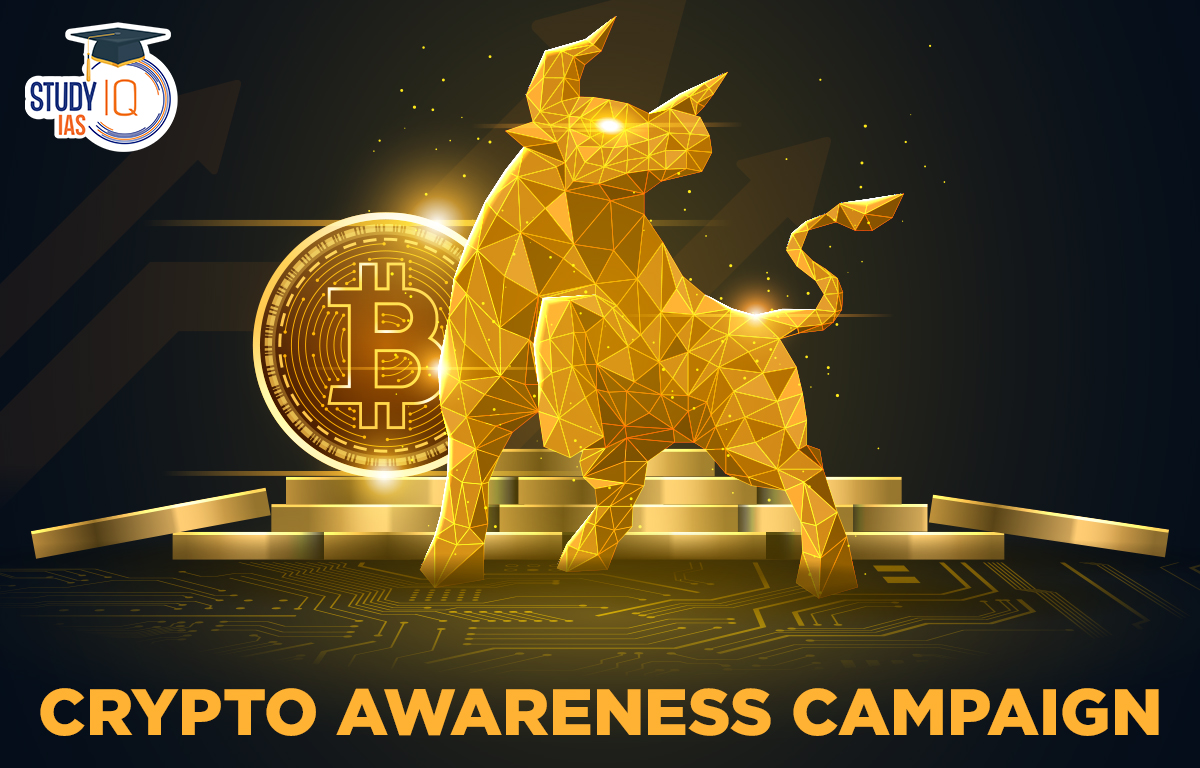Table of Contents
Context: The Union Government is set to launch an outreach programme to create awareness about cryptocurrencies and online gaming.
Crypto Awareness Campaign News
- The Investor Protection and Education Fund (IPEF), which falls under the Ministry of Corporate Affairs, will launch an outreach campaign.
- The programme will educate people about the risks associated with crypto assets.
What is Investor Education and Protection Fund (IEPF)?
- IEPF is managed by the IEPF Authority, which was set up in 2016 under the provisions of the Companies Act, 2013.
- The functions of the IEPF are:
- Administration of the IEPF
- Promoting awareness among investors,
- Makes refunds of shares, unclaimed dividends, matured deposits and debentures to rightful claimants.
- The investment education aims to teach basics to household investors, housewives and professionals alike in rural and urban areas.
- Focus areas include:
- Primary and secondary capital markets
- Saving instruments, instruments for investment (such as mutual funds, equity, among others)
- Making investors aware of dubious Ponzi and chit fund schemes and existing grievance redressal mechanisms, among other things.
- Till October 2022, it had conducted more than 65,000 awareness programmes covering 30 lakh citizens.
Ponzi and Chit Fund Schemes
- Ponzi scheme: It is an investment fraud that pays existing investors with funds collected from new investors.
- Ponzi scheme organizers often promise to invest subscriber’s money and generate high returns with little or no risk.
- But the fraudsters do not invest the money and instead use it to pay those who invested earlier and may keep some for themselves.
- Ponzi schemes are named after Charles Ponzi, who duped investors in the 1920s with a postage stamp speculation scheme.
- Chit Fund: A chit fund is both a savings and credit product.
- It bears a pre-determined value and is of a fixed duration, mostly two to three years.
- Each scheme admits a specific number of members whose monthly contributions adds up to the total value of the chit fund at the end of the term.
Need for Outreach Crypto Awareness Campaign
- Unregulated currency: Crypto is an unregulated currency having a destabilising effect on the monetary and fiscal stability of a country.
- Unlawful Activities: There is a fear that Crypto exchanges in India are involved in unlawful practices as drug trafficking, money laundering, violating foreign exchange legislation and evasion of GST.
- Legislation: The Reserve Bank of India has recommended framing legislation on the crypto sector.
- According to the RBI, cryptocurrencies should be prohibited.
- Volatility: Investing in Cryptocurrency can be a complex and risky endeavour as it is extremely volatile and works round the clock.
- Hence, it is important for potential investors to thoroughly educate themselves before making any decision.
- Investments: The programme will focus on the discouragement of ongoing investments in crypto by many micro and small investors in the nation.
- Gambling: The campaign will also focus on the opportunities that allow people to make extra money such as gambling.
About Online Gaming
- Nodal Agency: The Ministry of Electronics and Information Technology has been appointed the nodal industry for Online Gaming in India.
- A proposed framework for Central regulation by MeitY is expected to address issues in online gaming.
- Problems: Awareness about online gaming is needed as:
- It poses a risk of Cybercrimes.
- Playing online games leads to a serious gaming addiction which has been considered as a gaming disorder.
- Clicking links, images and pop-ups in websites may contain a virus and harm the computer, and may contain age-inappropriate content.
- It could also lead to loss of personal data and information.
- There is confusion about the definitions of a ‘game of chance’ and ‘game of skill’.
Way Forward
- Regulation: Apart from the outreach programme, there has to be a regulatory mechanism for the crypto sector.
- People may presume incorrectly that it is illegal.
- Right Message: If the government takes a heavy-handed approach and starts saying things like virtual currency is not legal in India that will not be entirely true. It has to convince investors of the potential risks.
- International collaboration: It has been stated that crypto assets are borderless.
- Any legislation for regulation or for banning would require international collaboration to prevent regulatory arbitrage.
- The collaboration must entail an evaluation of risks and benefits and evolution of common taxonomy and standards.


 Serious Fraud Investigation Office (SFIO...
Serious Fraud Investigation Office (SFIO...
 Article 142 of Indian Constitution, Sign...
Article 142 of Indian Constitution, Sign...
 Pakistan-Occupied Kashmir (PoK): History...
Pakistan-Occupied Kashmir (PoK): History...





















